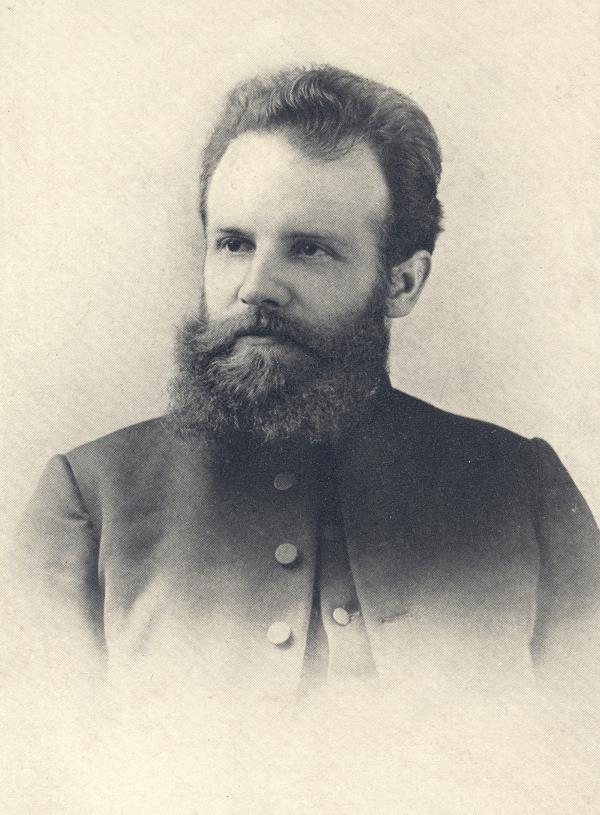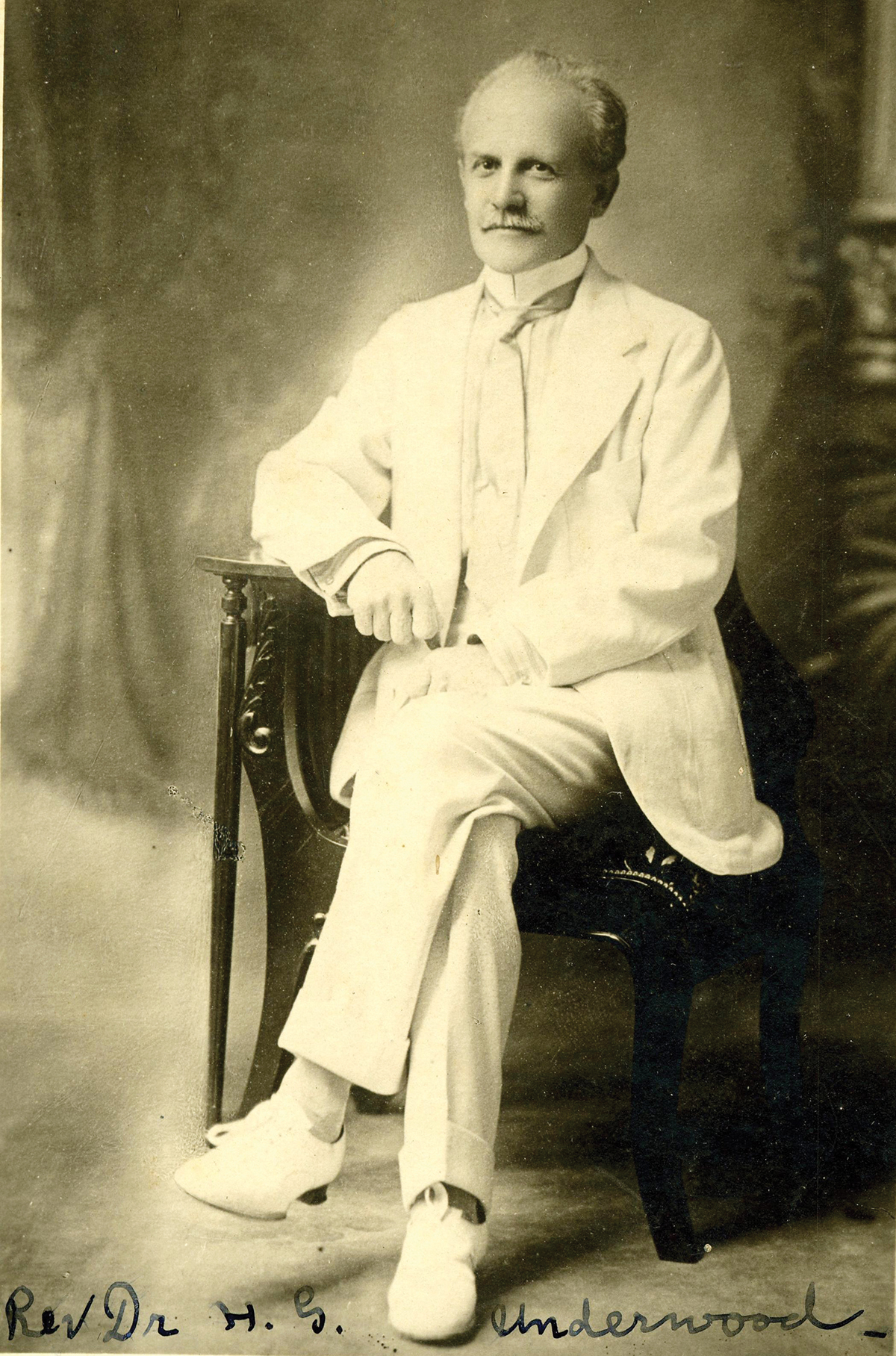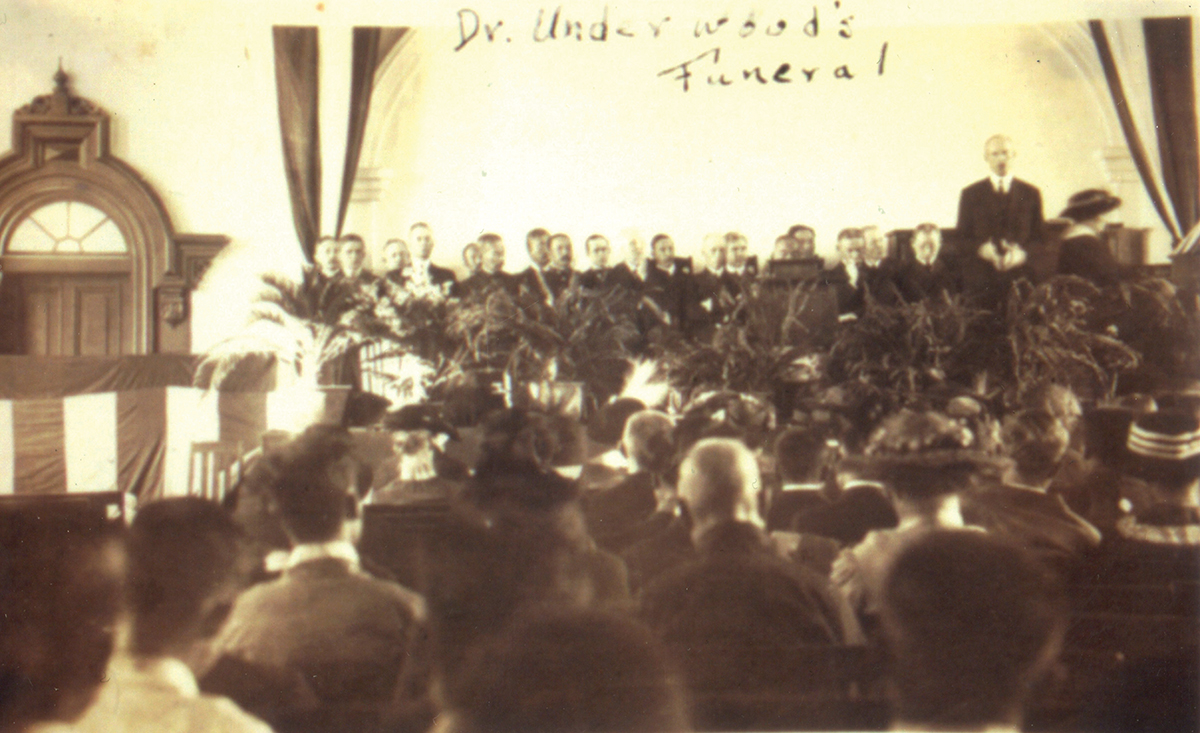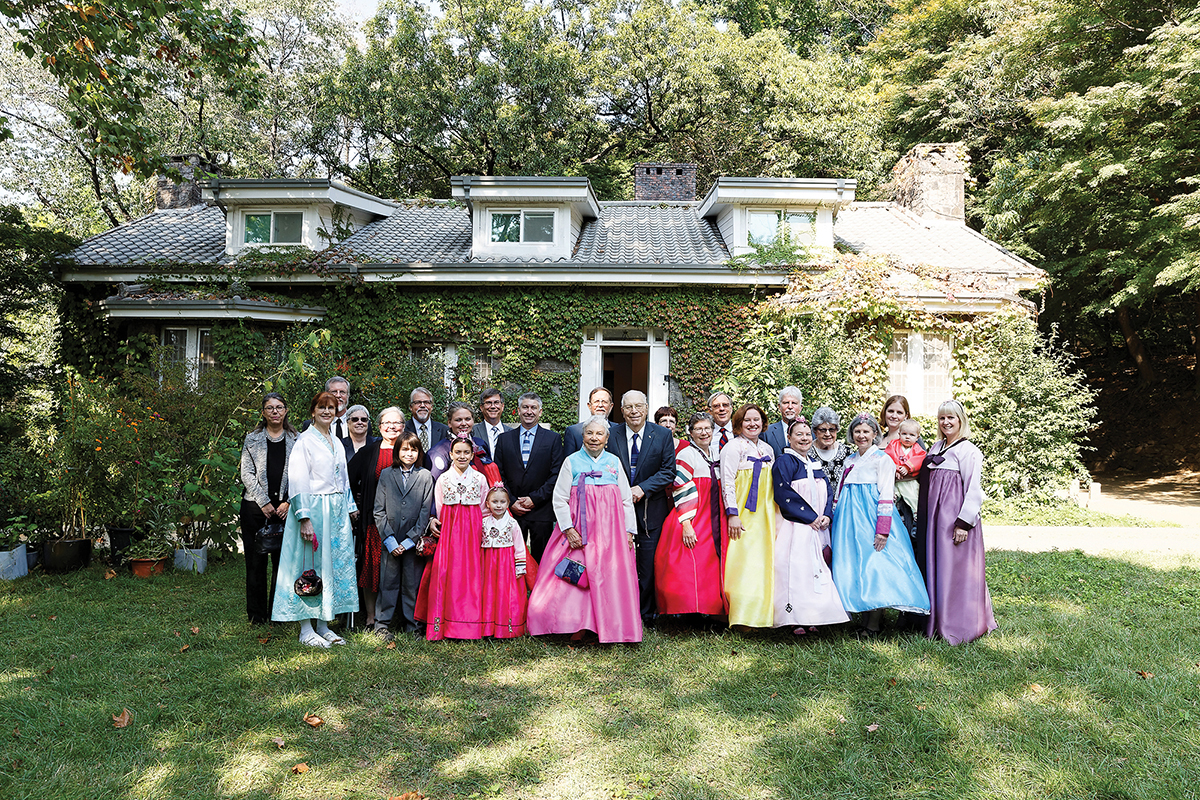Yonsei News
-
[YONSEI PEOPLE] Commemorating the Legacy of Horace Grant Underwood
연세대학교 홍보팀 / news@yonsei.ac.kr2016-10-24 -
Commemorating the Legacy of Horace Grant Underwood
(1859-1916)
-Created the Foundation for Modern Education and Missionary Work in Korea
 Lord, I cannot see anything at the moment.However, I believe that this land without schools and clinics,With only scorn and contempt, will soon become a land of God’s grace.—Underwood’s prayer in the novel Yanghwajin—Beginnings of Educational and Missionary Work: ChejungwonOctober 12, 2016 marked the 100th anniversary of the death of Horace Grant Underwood, the founder of Yonsei University. To commemorate a milestone, this issue seeks to present his spirit, accomplishments, and contributions to the university and country.On Easter Sunday, April 5, 1885, a ship landed at Jemulpo Port, Incheon. A man who would devote his life and enduring love to Chosun was on board. This was the Rev. Horace G. Underwood, a pioneer missionary to Korea. Immediately after his arrival, Underwood began to assist Dr. Horace Newton Allen in his medical services; with the founding of Chejungwon medical school, he served as a physics and chemistry teacher. In addition to his work at Chejungwon, he provided English classes for Korean students who sought him out. At the same time, Underwood showed great enthusiasm in learning Korean so that he could effectively teach in the language.Dictionary Compilation and Bible TranslationUnderwood was committed to translating the bible for the Korean people and organized a team of missionaries and Korean scholars to accomplish this task. He also compiled several books for foreign missionaries, including An Introduction to the Korean Spoken Language and the Korean-English Dictionary and English-Korean Dictionary. Underwood was also devoted to publishing Christian magazines and a newspaper.
Lord, I cannot see anything at the moment.However, I believe that this land without schools and clinics,With only scorn and contempt, will soon become a land of God’s grace.—Underwood’s prayer in the novel Yanghwajin—Beginnings of Educational and Missionary Work: ChejungwonOctober 12, 2016 marked the 100th anniversary of the death of Horace Grant Underwood, the founder of Yonsei University. To commemorate a milestone, this issue seeks to present his spirit, accomplishments, and contributions to the university and country.On Easter Sunday, April 5, 1885, a ship landed at Jemulpo Port, Incheon. A man who would devote his life and enduring love to Chosun was on board. This was the Rev. Horace G. Underwood, a pioneer missionary to Korea. Immediately after his arrival, Underwood began to assist Dr. Horace Newton Allen in his medical services; with the founding of Chejungwon medical school, he served as a physics and chemistry teacher. In addition to his work at Chejungwon, he provided English classes for Korean students who sought him out. At the same time, Underwood showed great enthusiasm in learning Korean so that he could effectively teach in the language.Dictionary Compilation and Bible TranslationUnderwood was committed to translating the bible for the Korean people and organized a team of missionaries and Korean scholars to accomplish this task. He also compiled several books for foreign missionaries, including An Introduction to the Korean Spoken Language and the Korean-English Dictionary and English-Korean Dictionary. Underwood was also devoted to publishing Christian magazines and a newspaper. Setting Groundwork for Korean Modern Education—Establishing Christian College, Yonhi CollegeAlong with his educational and missionary work at Chejungwon, Underwood sought to establish a school. The first step was to establish an orphanage that educated its children; eventually, this orphanage grew into Gyeongsin School. Underwood’s aspirations also included establishing an institution of higher education in Korea. With the assistance of the American minister to Korea, Hugh A. Dinsmore, Underwood requested permission from the Korean government to create a college. This first request was denied, and Underwood also encountered unexpected opposition to his plan from other missionaries. And with the beginning of the Japanese colonial period, the prospects for establishing a Christian university in Korea seemed bleak.
Setting Groundwork for Korean Modern Education—Establishing Christian College, Yonhi CollegeAlong with his educational and missionary work at Chejungwon, Underwood sought to establish a school. The first step was to establish an orphanage that educated its children; eventually, this orphanage grew into Gyeongsin School. Underwood’s aspirations also included establishing an institution of higher education in Korea. With the assistance of the American minister to Korea, Hugh A. Dinsmore, Underwood requested permission from the Korean government to create a college. This first request was denied, and Underwood also encountered unexpected opposition to his plan from other missionaries. And with the beginning of the Japanese colonial period, the prospects for establishing a Christian university in Korea seemed bleak. Underwood's Funeral (1916)Underwood, however, persevered, tirelessly speaking on the necessity of a Christian university for the nation and engaging in nonstop fundraising towards that end. Ultimately, Chosen Christian College, the predecessor of today’s Yonsei University, was established in March 1915. Most unfortunately, Underwood passed away on October 12, 1916, before the university was put on the right track. After Underwood's death, Avison who had been Underwood’s life-long friend and fellow worker, put an immenseamount of effort into helping the college acquire formal recognition as Yonhi College in 1917. It was only in 1999 that Underwood’s remains were Transferred to Yanghwajin’s Foreigners’ Cemetery.Underwood’s Missionary Work and Philosophy Embodied in Today’s Yonsei SpiritIn striving to establish a Christian college in Korea, he was convinced that such an institution must not only teach religion, but that it should also provide education in fields such as commerce, industry, technology, and culture. From the moment that Yonhi College and Severance Medical School combined to form Yonsei University, Underwood’s missionary work and philosophy have served as the foundation of the Yonsei spirit. This spirit entails practicing Christian love and educating students in a universal and liberal environment.Founding ChurchesUnderwood was unparalleled in his commitment to missionary work. In 1889, he established the Christian Literature Society of Korea and organized a chapter of the Young Men’s Christian Association (YMCA) in 1890. He traveled across the nation to administer baptisms and provide support and advice for establishing churches. Through his efforts, he established Saemoonan Church, the first organized church in Chosun. Underwood also helped establish more than 20 churches across the peninsula. Christianity thus became more firmly established on the Korean peninsula than anywhere else in Asia. Underwood practiced a missionary ecumenism; in every church he helped to establish he practiced this spirit, pursuing the dream of establishing a single, unified Protestant Church in Korea.In these ways, Underwood contributed immensely to the development of Korean society in a time of great upheaval, and it is no exaggeration to say that his influence in modern Korean society remains immeasurable. Underwood’s love for Korea did not come to an end with his death. Across four generations and up to this day, the Underwood family has contributed to Korea’s social, economic, spiritual, and educational development. Today, Yonsei stands as the nation’s most prestigious private university because of their efforts.Yonsei is committed to spreading the Underwood family’s spirit of love, sacrifice, and commitment throughout the world. In this, Yonsei hopes to be known as a respected and respectful university for the century to come.
Underwood's Funeral (1916)Underwood, however, persevered, tirelessly speaking on the necessity of a Christian university for the nation and engaging in nonstop fundraising towards that end. Ultimately, Chosen Christian College, the predecessor of today’s Yonsei University, was established in March 1915. Most unfortunately, Underwood passed away on October 12, 1916, before the university was put on the right track. After Underwood's death, Avison who had been Underwood’s life-long friend and fellow worker, put an immenseamount of effort into helping the college acquire formal recognition as Yonhi College in 1917. It was only in 1999 that Underwood’s remains were Transferred to Yanghwajin’s Foreigners’ Cemetery.Underwood’s Missionary Work and Philosophy Embodied in Today’s Yonsei SpiritIn striving to establish a Christian college in Korea, he was convinced that such an institution must not only teach religion, but that it should also provide education in fields such as commerce, industry, technology, and culture. From the moment that Yonhi College and Severance Medical School combined to form Yonsei University, Underwood’s missionary work and philosophy have served as the foundation of the Yonsei spirit. This spirit entails practicing Christian love and educating students in a universal and liberal environment.Founding ChurchesUnderwood was unparalleled in his commitment to missionary work. In 1889, he established the Christian Literature Society of Korea and organized a chapter of the Young Men’s Christian Association (YMCA) in 1890. He traveled across the nation to administer baptisms and provide support and advice for establishing churches. Through his efforts, he established Saemoonan Church, the first organized church in Chosun. Underwood also helped establish more than 20 churches across the peninsula. Christianity thus became more firmly established on the Korean peninsula than anywhere else in Asia. Underwood practiced a missionary ecumenism; in every church he helped to establish he practiced this spirit, pursuing the dream of establishing a single, unified Protestant Church in Korea.In these ways, Underwood contributed immensely to the development of Korean society in a time of great upheaval, and it is no exaggeration to say that his influence in modern Korean society remains immeasurable. Underwood’s love for Korea did not come to an end with his death. Across four generations and up to this day, the Underwood family has contributed to Korea’s social, economic, spiritual, and educational development. Today, Yonsei stands as the nation’s most prestigious private university because of their efforts.Yonsei is committed to spreading the Underwood family’s spirit of love, sacrifice, and commitment throughout the world. In this, Yonsei hopes to be known as a respected and respectful university for the century to come. the Underwood Family
the Underwood Family
vol. All
- vol. All
- vol. 1243
- vol. 1122
- vol. 125
- vol. 124
- vol. 123
- vol. 122
- vol. 121
- vol. 120
- vol. 119
- vol. 118
- vol. 117
- vol. 116
- vol. 115
- vol. 114
- vol. 113
- vol. 112
- vol. 111
- vol. 110
- vol. 109
- vol. 108
- vol. 107
- vol. 106
- vol. 105
- vol. 104
- vol. 103
- vol. 102
- vol. 101
- vol. 100
- vol. 99
- vol. 98
- vol. 97
- vol. 96
- vol. 95
- vol. 94
- vol. 93
- vol. 92
- vol. 91
- vol. 90
- vol. 89
- vol. 88
- vol. 87
- vol. 86
- vol. 85
- vol. 84
- vol. 83
- vol. 82
- vol. 81
- vol. 80
- vol. 79
- vol. 78
- vol. 77
- vol. 76
- vol. 75
- vol. 74
- vol. 73
- vol. 72
- vol. 71
- vol. 70
- vol. 69
- vol. 68
- vol. 67
- vol. 66
- vol. 65
- vol. 64
- vol. 63
- vol. 62
- vol. 61
- vol. 60
- vol. 59
- vol. 58
- vol. 57
- vol. 56
- vol. 55
- vol. 54
- vol. 53
- vol. 52
- vol. 51
- vol. 50
- vol. 49
- vol. 48
- vol. 47
- vol. 46
- vol. 45
- vol. 44
- vol. 43
- vol. 42
- vol. 41
- vol. 40
- vol. 39
- vol. 38
- vol. 37
- vol. 36
- vol. 35
- vol. 34
- vol. 33
- vol. 32
- vol. 31
- vol. 30
- vol. 29
- vol. 28
- vol. 27
- vol. 26
- vol. 25
- vol. 24
- vol. 23
- vol. 22
- vol. 21
- vol. 20
- vol. 19
- vol. 18
- vol. 17
- vol. 16
- vol. 15
- vol. 14
- vol. 13
- vol. 12
- vol. 11
- vol. 10
- vol. 9
- vol. 8
- vol. 7
- vol. 6
- vol. 5
- vol. 4
- vol. 3
- vol. 2
- vol. 1
- Show All
- COVER STORY
- YONSEI NEWS
- INTERNATIONAL RELATIONS
- Yonsei Global
- RESEARCH FRONTIER
- SERVANT LEADERSHIP
- YONSEI PEOPLE
- ABOUT YONSEI
- GLOBAL LOUNGE
- UIC News
- YONSEI GALLERY
- Around the World
- Around the nation
- Campus Review
- Ceremony
- Close Up
- Faculty Column
- Global Network
- The 21C Innovative Leader in Yonsei
- Yonsei Pride
- Yonsei Project